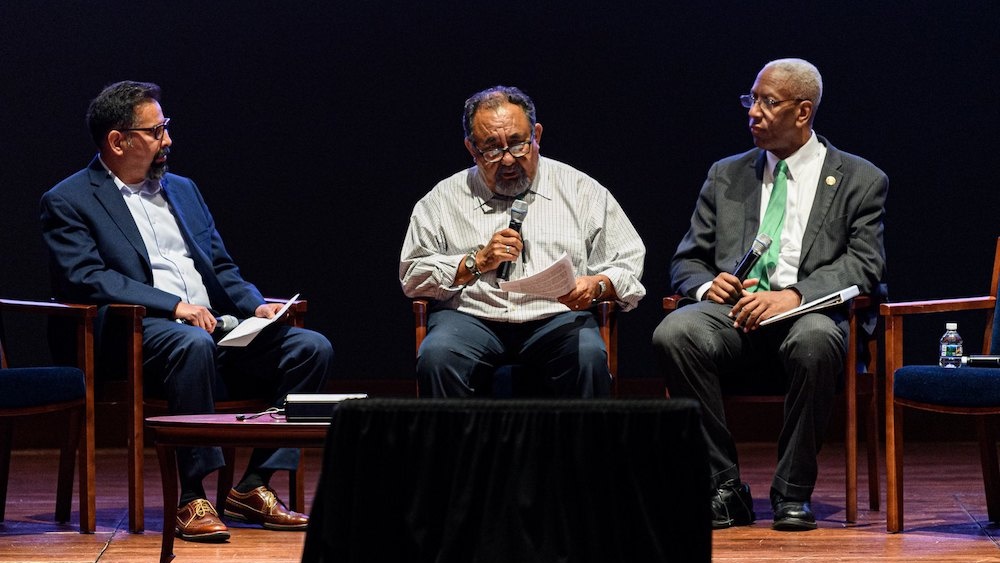If you’re interested in sharing your opinion on any cultural, political or personal topic, create an account here and check out our how-to post to learn more.
____
Co-written by Rep. Raul Grijalva
____
We believe that environmental justice is a critical issue of our time. The inequities in our nation’s laws — governing everything from the location of a garbage incineration plant near long-suffering and marginalized communities to which neighborhoods receive assistance after a natural disaster — have shaped our entire country and defined what is possible for millions of Americans, largely beyond public scrutiny.
These inequities are a civil rights issue, a public health issue and a Constitutional issue. Together we have spent the past year meeting with communities those inequities have hurt the most, and we believe Congress can no longer ignore them.
We visited with members of the Navajo Nation to better understand the impacts of uranium mining on their health. We met with residents of New Mexico who endure stifling air quality as a result of methane emissions in their back yards. We saw the impacts of sea-level rise and increased coastal flooding on Virginians. We traveled to Puerto Rico, where residents are still recovering from one of the deadliest hurricanes in modern memory.
It is no exaggeration to say that what we have heard continues to haunt us. Millions of Americans today live lives defined by pollution, resource scarcity and official indifference to suffering. They are tired of being ignored or treated as expendable. We share their anger and frustration.
That is why, after an extensive listening tour and what we believe is an unprecedented, open-source legislative drafting process, we are releasing a statement of principles today that will guide our forthcoming environmental justice bill. The bill, which is being developed with real-time public input from the beginning of the process, will offer policy solutions we believe the American people badly need.
Indeed, we urge our colleagues to seek out similar conversations. They may be surprised to discover how many are available in their own communities. Our experiences supported our convictions in a way that no amount of time spent in Washington could match. Looking into peoples’ eyes and taking their stories of environmental injustice to the heart is a profound, and sometimes necessarily unsettling, experience.
Since the end of the last Congress, we have collaborated with key environmental justice leaders to generate truly community-led, community-driven legislation — an effort to speak to peoples’ real needs, not just what Washington interprets them to be.
As part of this process, earlier this year, we hosted the first-ever Congressional Convening on Environmental Justice at the U.S. Capitol. Hundreds of advocates, leaders and practitioners traveled to Washington, D.C., to share their views and priorities, speak with members of Congress and learn from the nation’s foremost environmental justice experts and scholars. That event began the process of accepting public input on the first draft of our statement of environmental justice policy principles. We have been collecting input and comments ever since, including while hosting a series of environmental justice panel conversations during the Congressional Black Caucus Foundation’s annual legislative conference.
Today, with the release of the final version of that statement, we begin the next phase of what we consider an overdue and necessary project in Congress: the drive for comprehensive environmental justice legislation. The principles we are releasing today will shape a bill that tackles discrimination in environmental decision-making; addresses gaps in our government’s understanding of environmental justice concerns and agencies’ ability to respond appropriately; and works toward eliminating the disproportionate impacts of pollution faced by communities of color, low-income communities, and other vulnerable populations.
Our principles are available at naturalresources.house.gov. We invite the public to visit the site, learn more and join us as we prepare to introduce our bill in the coming months.
American communities face serious environmental and public health problems, and our political discourse has failed to capture their urgency. We need to solve these problems with community-led, community-driven initiatives. Above all, we need to listen to the people telling us that environmental injustice cannot continue. It has led to uncountable deaths that should have been prevented. It has hurt families and made children sick. It has damaged our country, and it will no longer be ignored.
We are working to build a fairer, healthier society that listens to all voices, regardless of income or political status. We believe in the power of public collaboration and participation. We hope you will join us.
____
Rep. Raul Grijalva (AZ-03) is Chair of the Natural Resources Committee and Rep. Donald McEachin (VA-04) is a member of the Natural Resources Committee and co-founder of the United for Climate and Environmental Justice Taskforce
